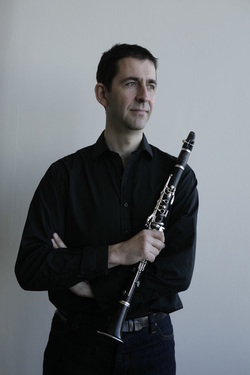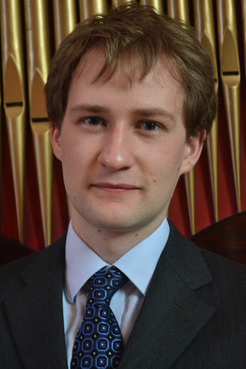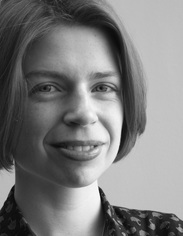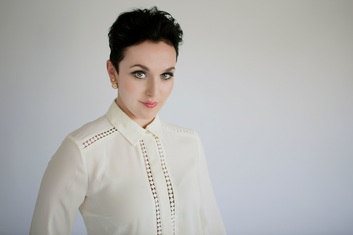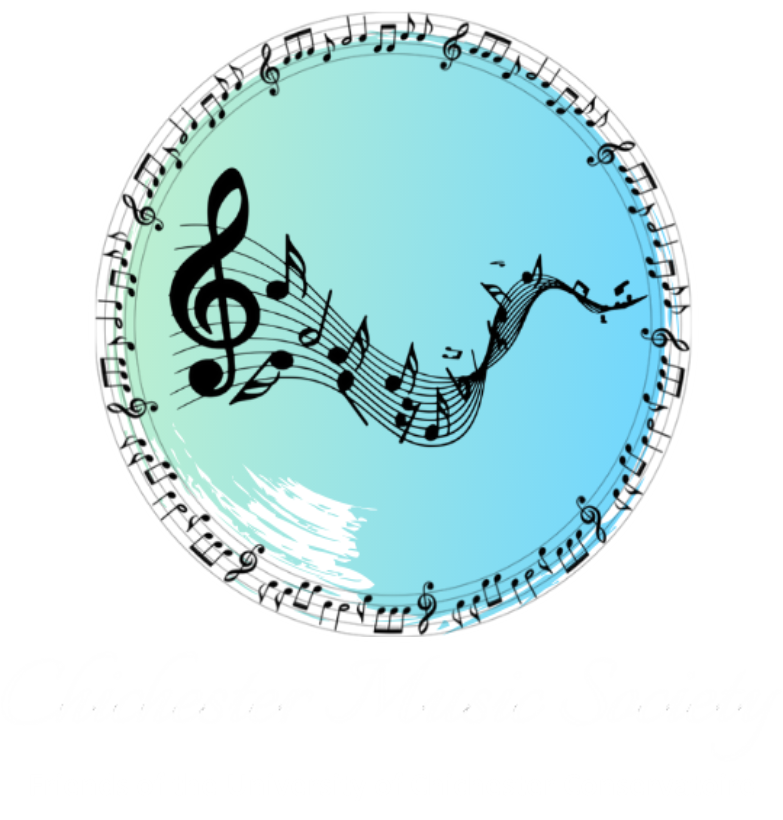Reviews for 2016
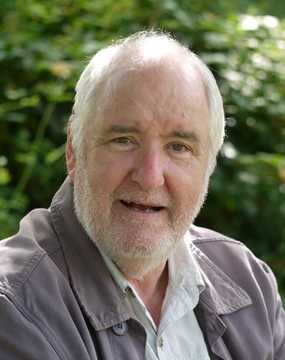
Special Christmas Event
Mick Csáky - Capturing Music on Film
The Christmas Musical Event for the Funtington Music Group was held at the University of Chichester on 14 December, where the prolific film maker, Mick Csaky, gave a fascinating presentation, Capturing Music on Film, covering a number of his music based films which he had directed for the BBC and other organisations over the past 40 years.
During the first half he showed extracts from film interviews including one with Placido Domingo, and another with the composer, Michael Tippett, who shared in a remarkably poignant, personal, and self-effacing way, how he began to create the music in his third symphony. This was a really special and particularly unusual opening of the secrets of a composer to the wider world.
In complete contrast, he then showed the audience a short extract of a film that he had made about Sister Rosetta Tharpe, a little known singer pre-Elvis Rock singer, who was called The Godmother of Rock & Roll, with interviews from well-known personalities who explained how influential she was in the nineteen-forties, fifties and sixties.
The final film extract, before the interval, was one he had made for Roll Back Malaria. This film helped raise $20 million for anti-malaria research. It opened at the UN Assembly with an estimated audience of a billion people. The clip featured a formidable singer called Angelique Kidjo, whose voice was unbelievably moving, and which gave a real insight into the strength and power of African music.
After the interval, and in complete contrast to the first half, Mick Csaky played a number of extracts from his 90-minute opera movie entitled Mozart in Turkey, which was shot at the Topkapi Palace in Istanbul. The clips allowed the audience to grasp the plot of the opera, The Abduction from the Seraglio, and also to soak up the atmosphere as the singers performed in the actual palace where Mozart had set the action.
David Tinsley, Chairman of the Funtington Music Group said, “It was a real privilege to hear about some of the films Mick Csaky has made and to see how films on music are put together. The ones chosen showed us a delightful cross-section of musical genres, and demonstrated how much passion Mick Csaky has put into his productions.”
Mick Csáky - Capturing Music on Film
The Christmas Musical Event for the Funtington Music Group was held at the University of Chichester on 14 December, where the prolific film maker, Mick Csaky, gave a fascinating presentation, Capturing Music on Film, covering a number of his music based films which he had directed for the BBC and other organisations over the past 40 years.
During the first half he showed extracts from film interviews including one with Placido Domingo, and another with the composer, Michael Tippett, who shared in a remarkably poignant, personal, and self-effacing way, how he began to create the music in his third symphony. This was a really special and particularly unusual opening of the secrets of a composer to the wider world.
In complete contrast, he then showed the audience a short extract of a film that he had made about Sister Rosetta Tharpe, a little known singer pre-Elvis Rock singer, who was called The Godmother of Rock & Roll, with interviews from well-known personalities who explained how influential she was in the nineteen-forties, fifties and sixties.
The final film extract, before the interval, was one he had made for Roll Back Malaria. This film helped raise $20 million for anti-malaria research. It opened at the UN Assembly with an estimated audience of a billion people. The clip featured a formidable singer called Angelique Kidjo, whose voice was unbelievably moving, and which gave a real insight into the strength and power of African music.
After the interval, and in complete contrast to the first half, Mick Csaky played a number of extracts from his 90-minute opera movie entitled Mozart in Turkey, which was shot at the Topkapi Palace in Istanbul. The clips allowed the audience to grasp the plot of the opera, The Abduction from the Seraglio, and also to soak up the atmosphere as the singers performed in the actual palace where Mozart had set the action.
David Tinsley, Chairman of the Funtington Music Group said, “It was a real privilege to hear about some of the films Mick Csaky has made and to see how films on music are put together. The ones chosen showed us a delightful cross-section of musical genres, and demonstrated how much passion Mick Csaky has put into his productions.”
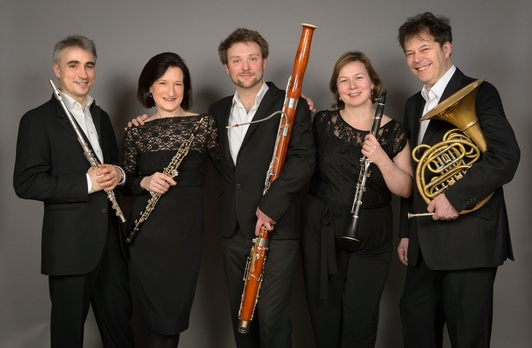
November - New London Chamber Ensemble
The New London Chamber Ensemble returned to the Funtington Music Group on 9 November at the University of Chichester to give a concert, entitled Mainly Mozart, to a large and enthusiastic audience. The five players, all eminent musicians in their own right, were Steven Stirling (French Horn), Melanie Wragg (oboe), Chris Rawley (basson), Robert Manasse (clarinet) and Neyire Ashworth (clarinet).
The Ensemble, “founded over a decade ago, is a wind quintet with a difference”, as their choice of programme aptly demonstrated. For instance the first piece by Mozart, Andante for Mechanical Organ K616, really did sound as if it was played on an organ. This splendid arrangement by Philip Cashian (born 1963) was an introductory taster of the varied programme that was to follow, as all the Mozart pieces that were played were re-arranged in the 20th or 21st Century. Each of the Ensemble musicians has the gift of making the Ensemble sound natural, unforced and instinctive, yet they all possess an individual talent that makes the technical demands of the music seem insignificant.
The flute solo was Corrente composed by J S Bach and played by Robert Manasse. Here he showed his accomplished musical talent, producing a remarkable clarity and definition of sound, with a complete understanding of the music, to create a stunning performance.
The Ensemble then continued with the Arrangement, including Variations composed by Sally Beamish [born 1956], in Mozart’s Adagio K356. This piece began with music that sounded largely traditional Mozart, but ended in the modern era with a fully 21st Century contemporary composition. The players showed their complete mastery of this avant garde genre of music.
The second soloist, Neyire Ashworth, playing the clarinet, chose Capriccio No 3 for Solo Clarinet by Mozart. This would have been a valid choice for an elite musical competition as its demands on the soloist are immense. Neyire interpreted this work with marvellous precision and richness of tone, combined with a seemingly effortless virtuosic skill.
The concert concluded with a beautiful performance of Serenade in C Minor K406, by Mozart, arranged by Ilan Rechtman (born 1963). The melodies were beautifully sculptured, and the Ensemble, while playing with an exquisite delicacy in the more tranquil areas, showed an abundant energy in the more demanding sections. Throughout they kept the sound between the five instruments beautifully balanced.
David Tinsley, Chairman of the Funtington Music Group, commented, “The rousing and appreciative level of the audience’s applause demonstrates what a superb concert this has been. The five individuals, brilliant as soloists, were simply outstanding as an Ensemble. This is their second visit to the Funtington Music Group, and I am sure they will be asked to return again.”
The New London Chamber Ensemble returned to the Funtington Music Group on 9 November at the University of Chichester to give a concert, entitled Mainly Mozart, to a large and enthusiastic audience. The five players, all eminent musicians in their own right, were Steven Stirling (French Horn), Melanie Wragg (oboe), Chris Rawley (basson), Robert Manasse (clarinet) and Neyire Ashworth (clarinet).
The Ensemble, “founded over a decade ago, is a wind quintet with a difference”, as their choice of programme aptly demonstrated. For instance the first piece by Mozart, Andante for Mechanical Organ K616, really did sound as if it was played on an organ. This splendid arrangement by Philip Cashian (born 1963) was an introductory taster of the varied programme that was to follow, as all the Mozart pieces that were played were re-arranged in the 20th or 21st Century. Each of the Ensemble musicians has the gift of making the Ensemble sound natural, unforced and instinctive, yet they all possess an individual talent that makes the technical demands of the music seem insignificant.
The flute solo was Corrente composed by J S Bach and played by Robert Manasse. Here he showed his accomplished musical talent, producing a remarkable clarity and definition of sound, with a complete understanding of the music, to create a stunning performance.
The Ensemble then continued with the Arrangement, including Variations composed by Sally Beamish [born 1956], in Mozart’s Adagio K356. This piece began with music that sounded largely traditional Mozart, but ended in the modern era with a fully 21st Century contemporary composition. The players showed their complete mastery of this avant garde genre of music.
The second soloist, Neyire Ashworth, playing the clarinet, chose Capriccio No 3 for Solo Clarinet by Mozart. This would have been a valid choice for an elite musical competition as its demands on the soloist are immense. Neyire interpreted this work with marvellous precision and richness of tone, combined with a seemingly effortless virtuosic skill.
The concert concluded with a beautiful performance of Serenade in C Minor K406, by Mozart, arranged by Ilan Rechtman (born 1963). The melodies were beautifully sculptured, and the Ensemble, while playing with an exquisite delicacy in the more tranquil areas, showed an abundant energy in the more demanding sections. Throughout they kept the sound between the five instruments beautifully balanced.
David Tinsley, Chairman of the Funtington Music Group, commented, “The rousing and appreciative level of the audience’s applause demonstrates what a superb concert this has been. The five individuals, brilliant as soloists, were simply outstanding as an Ensemble. This is their second visit to the Funtington Music Group, and I am sure they will be asked to return again.”
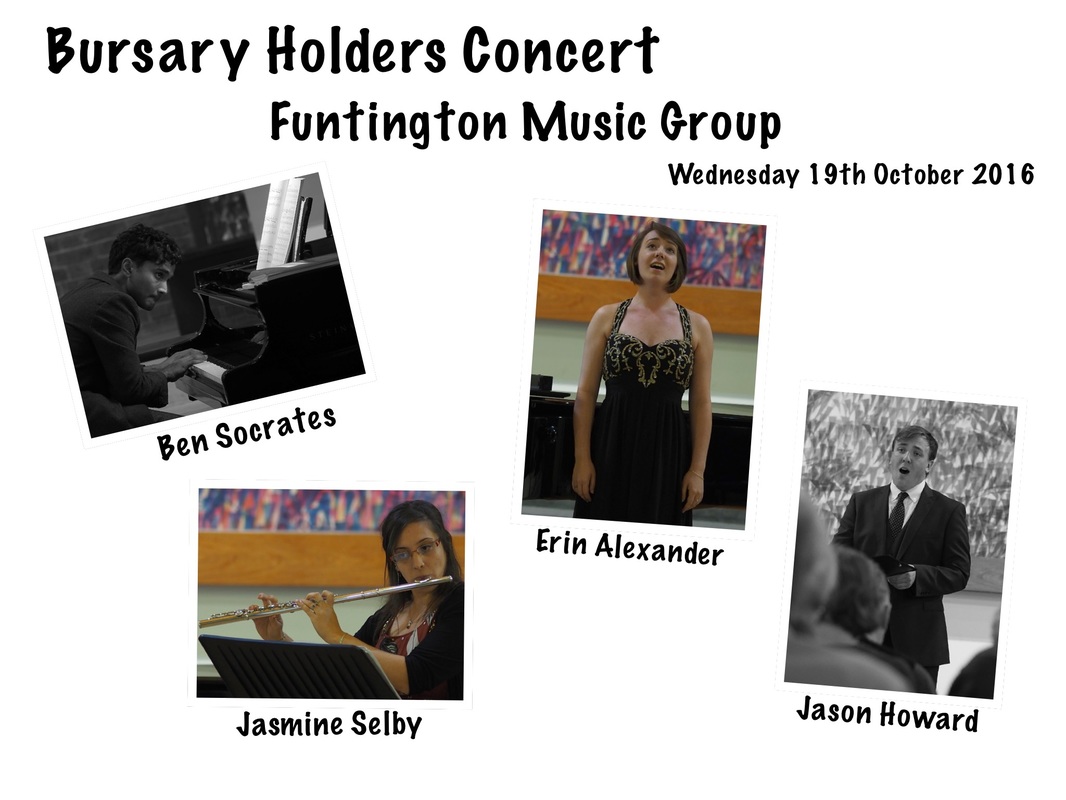
On 19 October the Funtington Music Group was delighted to host the 2016 Robert Headley Memorial Concert at the University of Chichester. The Group was pleased to invite back four outstanding Robert Headley Fund prize-winners and bursary holders from previous years at the University of Chichester.
Jason Howard [Countertenor] opened the concert with a selection of Early English songs from Handel and Purcell, and he also included Debussy’s, Beau Soir. Although Jason said his preference was for “Early Music”, his rendition of this 20th Century song was outstanding, and he caught the atmosphere of the music perfectly. The final piece by Handel was also admirably crafted, and his voice, effortlessly clear, with lyrical warmth, was well appreciated by the audience.
Jasmine Selby [Flute] then performed Nocturne by Geraldine Green, a contemporary Irish composer. She created an atmospheric calm, with long luscious notes, that demonstrated well her musical ability. She was accompanied by Chris Coote on piano, who was a sensitive and creative accompanist throughout the concert. He had also incidentally put together on behalf of the Funtington Music Group this very special additional concert for members. Jasmine ended her performance by playing Reinecke’s Undine Sonata Opus 167. She is a talented musician and in the final movement she was able to prove her virtuosity. Her performance was much enjoyed by the audience.
After the interval Ben Socrates [Piano] played two pieces by Debussy which included three very different and contrasting Preludes. Debussy’s music is of course full of impressionistic colours, and shimmering, and elusive light, and Ben caught the atmosphere throughout with an admirable technique, and rhythmic precision and luminous and shaded playing. With a difficult and challenging Sonata by Scarlatti to finish, the audience was delighted with his performance.
To end the concert Erin Alexander [Soprano] took to the floor, and she chose as her introductory piece Gounod’s Ah, je veux vivre from Romeo and Juliette. It is a gamble to begin with such a challenging introductory piece but Erin admirably portrayed the flighty, free-spirited young girl, Juliette, and she ably demonstrated that she also has real acting ability. Her programme included songs by Clara Schumann, Johann Strauss, and Mozart. She sang in three languages and the audience very much appreciated her performance.
David Tinsley, Chairman of the Funtington Music Group, said, “I was delighted to hear from these four maturing musicians how the contributions from Funtington Music Group had made such a welcome contribution to their development, and I am very grateful to all four for returning to perform so ably this evening. This was a very special concert.”
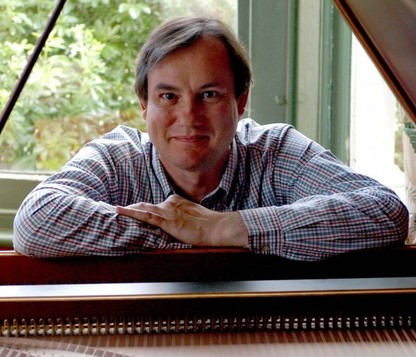
October
Peter Medhurst
Peter Medhurst, pianist, singer and lecturer, returned to the Funtington Music Group on 5th October at the University of Chichester to give his multi-media presentation entitled “Dissecting Schubert.”
Peter enthused the audience with a marvellously appropriate slide presentation. This sometimes included screen shots of the sheet music of the song which Peter was singing at the time, or original portraits of Schubert and his family and friends; along with modern photographs of the houses Schubert lived in. The audience was sped along a historic trajectory spanning Schubert’s relatively short life.
Peter Medhurst emphasized that Schubert was not a child prodigy, unlike Mozart or Beethoven, so his repertoire was condensed into a relatively few years as he died before he was 32. Schubert was not very well-known during his life because preferred being with his friends, rather than promoting himself in the community. For instance, the first piece of his music was printed only in 1821, just seven years before he died.
A whole myriad of fascinating facts and examples were presented including a dissection of the thought processes that Schubert is likely to have gone through in composing his songs. Peter Medhurst illustrated brilliantly how Schubert developed, during the 1820s, into the genius we recognise today.
At the end of the evening, the audience showed their appreciation with continuous applause, and David Tinsley, Chairman of Funtington Music Group, summed up by saying, “Peter Medhurst is a musical polymath, talented in many diverse and challenging disciplines. We learnt so much in such a short time, all well illustrated by effective musical examples on the piano and in song. A stunning lecture recital”
Peter Medhurst
Peter Medhurst, pianist, singer and lecturer, returned to the Funtington Music Group on 5th October at the University of Chichester to give his multi-media presentation entitled “Dissecting Schubert.”
Peter enthused the audience with a marvellously appropriate slide presentation. This sometimes included screen shots of the sheet music of the song which Peter was singing at the time, or original portraits of Schubert and his family and friends; along with modern photographs of the houses Schubert lived in. The audience was sped along a historic trajectory spanning Schubert’s relatively short life.
Peter Medhurst emphasized that Schubert was not a child prodigy, unlike Mozart or Beethoven, so his repertoire was condensed into a relatively few years as he died before he was 32. Schubert was not very well-known during his life because preferred being with his friends, rather than promoting himself in the community. For instance, the first piece of his music was printed only in 1821, just seven years before he died.
A whole myriad of fascinating facts and examples were presented including a dissection of the thought processes that Schubert is likely to have gone through in composing his songs. Peter Medhurst illustrated brilliantly how Schubert developed, during the 1820s, into the genius we recognise today.
At the end of the evening, the audience showed their appreciation with continuous applause, and David Tinsley, Chairman of Funtington Music Group, summed up by saying, “Peter Medhurst is a musical polymath, talented in many diverse and challenging disciplines. We learnt so much in such a short time, all well illustrated by effective musical examples on the piano and in song. A stunning lecture recital”
September - Ensemble Reza
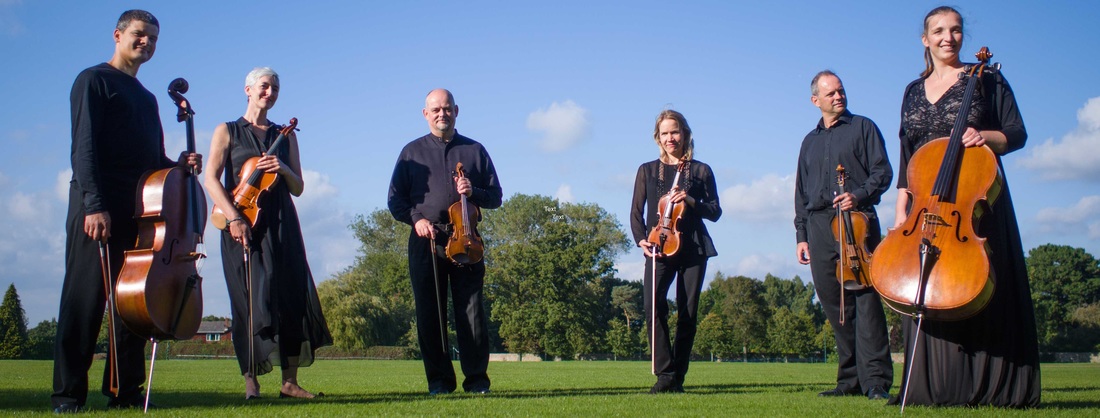
The Funtington Music Group opened their autumn season with a stunning concert from the Ensemble Reza on 14 September at the University of Chichester.
After an introductory performance by four of the sextet of Webern’s Langsamer Satz, the Ensemble played Brahms’ Sextet No 2 in G, opus 36. The six players demonstrated a deep understanding of Brahms music. For instance, the beautiful lyrical music of the third movement was played with a gently expressed, unaffected, yet heart-warming style, while in contrast the fourth movement was delightfully developed to the gripping finale, with sheer exuberance and expertise. This sextet is one of Brahms’ finest, most warming and romantic chamber works and the Reza performed it immaculately.
After the interval the Ensemble expertly played another physically demanding and musically challenging sextet. This was Tchaikovsky’s String Sextet in D Minor, Opus 70, Souvenir de Florence. This programme choice was a gem in that the music of these two contemporary composers is so absolutely different that by playing them alongside each other the audience can readily see their contrasting approaches to the genre of the sextet. The Reza played the Tchaikovsky as a true Ensemble, listening, responding, and playing as one unit, creating such beautiful and mesmerising music. It was a magical performance.
David Tinsley, Chairman of the Funtington Music Group, said, “This was a most enjoyable concert, enriched by musicians performing at the top of their game.”
After an introductory performance by four of the sextet of Webern’s Langsamer Satz, the Ensemble played Brahms’ Sextet No 2 in G, opus 36. The six players demonstrated a deep understanding of Brahms music. For instance, the beautiful lyrical music of the third movement was played with a gently expressed, unaffected, yet heart-warming style, while in contrast the fourth movement was delightfully developed to the gripping finale, with sheer exuberance and expertise. This sextet is one of Brahms’ finest, most warming and romantic chamber works and the Reza performed it immaculately.
After the interval the Ensemble expertly played another physically demanding and musically challenging sextet. This was Tchaikovsky’s String Sextet in D Minor, Opus 70, Souvenir de Florence. This programme choice was a gem in that the music of these two contemporary composers is so absolutely different that by playing them alongside each other the audience can readily see their contrasting approaches to the genre of the sextet. The Reza played the Tchaikovsky as a true Ensemble, listening, responding, and playing as one unit, creating such beautiful and mesmerising music. It was a magical performance.
David Tinsley, Chairman of the Funtington Music Group, said, “This was a most enjoyable concert, enriched by musicians performing at the top of their game.”
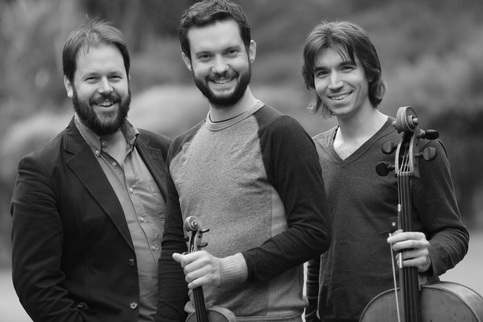
June
The Phoenix Piano Trio
For its annual Summer event on 8 June, Funtington Music Group welcomed The Phoenix Piano Trio at the University of Chichester. The concert opened with a performance of Schumann’s Six Studies for Pedal Piano Opus 56 arranged by Kirchner for a Piano Trio. This was such an appropriate introductory choice as it allowed the Trio to demonstrate their technical abilities and their deep understanding of Romanticist music.
The first half then concluded with a vibrant performance of the Piano Trio No 2 in F Major Opus 80, again by Robert Schumann. The strings and piano together in this passionate work ably demonstrated the robust themes, subtle harmonies and challenging sections that the composer interweaves into this sparkling yet contradictory musical composition. It was a stunning and immensely appreciated performance.
After the interval, when both audience and musicians had enjoyed a buffet meal, the concert concluded with a performance of Beethoven’s Trio in B Flat Major Opus 97, The Archduke. Sholto Kynoch, who had also introduced all the pieces to the audience, was a highly skilled pianist, never overshadowing or drowning out the strings. There was such unity of purpose that the playing of violinist Jonathan Stone and cellist Christian Elliott helped to create an intense inward impression that was technically brilliant and emotionally effective. The impetuous finale was outstanding.
David Tinsley, Chairman of The Funtington Music Group, said, “This was a splendid performance by three supremely talented musicians acting as one who created a memorable and vibrant musical experience for our special Summer Concert.”
The Phoenix Piano Trio
For its annual Summer event on 8 June, Funtington Music Group welcomed The Phoenix Piano Trio at the University of Chichester. The concert opened with a performance of Schumann’s Six Studies for Pedal Piano Opus 56 arranged by Kirchner for a Piano Trio. This was such an appropriate introductory choice as it allowed the Trio to demonstrate their technical abilities and their deep understanding of Romanticist music.
The first half then concluded with a vibrant performance of the Piano Trio No 2 in F Major Opus 80, again by Robert Schumann. The strings and piano together in this passionate work ably demonstrated the robust themes, subtle harmonies and challenging sections that the composer interweaves into this sparkling yet contradictory musical composition. It was a stunning and immensely appreciated performance.
After the interval, when both audience and musicians had enjoyed a buffet meal, the concert concluded with a performance of Beethoven’s Trio in B Flat Major Opus 97, The Archduke. Sholto Kynoch, who had also introduced all the pieces to the audience, was a highly skilled pianist, never overshadowing or drowning out the strings. There was such unity of purpose that the playing of violinist Jonathan Stone and cellist Christian Elliott helped to create an intense inward impression that was technically brilliant and emotionally effective. The impetuous finale was outstanding.
David Tinsley, Chairman of The Funtington Music Group, said, “This was a splendid performance by three supremely talented musicians acting as one who created a memorable and vibrant musical experience for our special Summer Concert.”
The Funtington Music Group welcomed Nicholas Carpenter (clarinet) and Timothy Ravalde (piano) at the University of Chichester on 11 May.
The evening started with Nicolas Carpenter playing numerous extracts, and elaborating on the different sounds that come from the whole variety of clarinets that he had brought with him, from the B Flat which is the starter clarinet for students, through to the cumbersome Base Clarinet in A. He then, with consummate skill, and a shrewd choice of examples, fascinatingly showed how composers use the sound that emerges from different clarinets to create the mood and atmosphere that they are seeking.
For instance, Berlioz used the E Flat sound in his Symphonie Fantastique, to suggest in the Witches Sabbath an appropriate supernatural eerie haunting sound. Schubert in his 3rd Symphony used the C Clarinet that produced the lighter, delicate sound more appropriate for the music he was writing. Interestingly, Nicolas Carpenter pointed out that it is only in the past quarter century that conductors have more regularly requested that the clarinet that the composer actually listed is the actual clarinet that should be played.
After the interval both musicians expertly performed Weber’s Grand Duo Concertante, their technical accomplishment and interpretation faultless. The accompaniment of Timothy Ravalde was outstanding. The concert concluded with a delicate and beautiful performance of Debussy’s Premiere Rhapsodie. Both artists brought to the concert a focused and deeply engrained musicality, enhanced by their close rapport. The audience showed their appreciation with enthusiastic and extended applause.
As David Tinsley, Chairman of the Funtington Music Group said, “I was overwhelmed by the absolute skill that each of these musicians possess. They, tonight, produced such beautiful music. This was an evening to remember and treasure.”
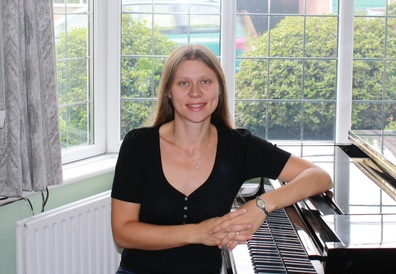
March
Tanya Ursova (piano)
The Funtington Music Group lecture recital on 9th March at the University of Chichester was given by the highly talented Ukrainian pianist Tanya Ursova and illustrated the Impact of the 1917 Russian Revolution on the life and works of Rachmaninov, Prokofiev and Shostakovitch.
Tanya’s deep knowledge and understanding of the subject quickly became apparent as she described how each composer had followed their own path to physical and creative survival in an often hostile artistic and political environment. The recital began with The Elegie and Prelude from Rachmaninov’s Morceaux de Fantaisie. The Prelude in C sharp quickly became Rachmaninov’s most popular work, and he was forced to play it at every recital. Tanya’s sensitive and passionate playing was soon in evidence, the rhapsodic Elegie yearning and flowing, the Prelude carried along with a strong impulse with the wide dynamics revealing a high emotional charge underpinned with sure technical control. Two preludes from Op.32 followed, the first serious the second animated and sparkling, both showing Rachmaninov at the height of his creative powers. With the tolling bells of the Russian Orthodox Church clearly heard, Tanya drew our attention to the strong influence of religion and fatalism to Rachmaninov’s life and his compositional style. The 1917 revolution caused Rachmaninov to flee his native Russia and turn to playing the piano for a living in the West. We were shocked to learn how badly his career as a composer suffered with him only composing 6 more works in a period of 26 years after 1917.
Prokofiev, with his Suggestion Diabolique provided the perfect opportunity to hear Tanya in some uniquely witty and amusing music. We were then treated to three excerpts from Prokofiev’s revolutionary and highly innovative ballet Romeo and Juliet. Tanya described how the music of this piece was organically woven into its final movement illustrating how this wonderful music was highly suggestive of the unfolding drama, threatening atmosphere and emotions of the lovers. The music was brilliantly realized by Tanya, the Chapel’s Steinway piano made to produce as full, rich and ringing a tone, as most in the audience could recall hearing!
After the interval and a sparkling, highly rhythmical performance of the Vivace from Prokofiev’s 6th Sonata, Tanya moved on to consider Shostakovitch, the composer perhaps closest to her heart. In 1917, she told us, Shostakovitch was only 11 years old and his family had to survive the revolution as best as they could. The March from the Three Fantastic Dances was Shostakovitch’s first public piece and “showed all the promise of a young genius at work”. In 1924 Stalin came to power and composers were expected to portray “the happy proletarian life, to write optimistic music”. 1936 was an important milestone in the composer’s life with the performance of his opera Lady Macbeth of the Mtsensk District. Despite critical acclaim the opera was thought by Stalin to be “chaos instead of music”, the comment marking the ruin of Shostakovitch’s life, from which point “he would keep a packed suitcase next to his front door so that he might leave quietly without upsetting his family”. Tanya’s final piece was the remarkable and technically demanding Prelude and Fugue in D Minor Op.87 No.24. This was a brilliant and heartfelt performance.
Following a wonderful Rachmaninov encore, David Tinsley, Chairman of the Funtington Music Group said of a first rate evening that “We are very lucky to have had such fantastic pianistic skill combined with wonderful erudition”. Sentiments echoed by all present!
Tanya Ursova (piano)
The Funtington Music Group lecture recital on 9th March at the University of Chichester was given by the highly talented Ukrainian pianist Tanya Ursova and illustrated the Impact of the 1917 Russian Revolution on the life and works of Rachmaninov, Prokofiev and Shostakovitch.
Tanya’s deep knowledge and understanding of the subject quickly became apparent as she described how each composer had followed their own path to physical and creative survival in an often hostile artistic and political environment. The recital began with The Elegie and Prelude from Rachmaninov’s Morceaux de Fantaisie. The Prelude in C sharp quickly became Rachmaninov’s most popular work, and he was forced to play it at every recital. Tanya’s sensitive and passionate playing was soon in evidence, the rhapsodic Elegie yearning and flowing, the Prelude carried along with a strong impulse with the wide dynamics revealing a high emotional charge underpinned with sure technical control. Two preludes from Op.32 followed, the first serious the second animated and sparkling, both showing Rachmaninov at the height of his creative powers. With the tolling bells of the Russian Orthodox Church clearly heard, Tanya drew our attention to the strong influence of religion and fatalism to Rachmaninov’s life and his compositional style. The 1917 revolution caused Rachmaninov to flee his native Russia and turn to playing the piano for a living in the West. We were shocked to learn how badly his career as a composer suffered with him only composing 6 more works in a period of 26 years after 1917.
Prokofiev, with his Suggestion Diabolique provided the perfect opportunity to hear Tanya in some uniquely witty and amusing music. We were then treated to three excerpts from Prokofiev’s revolutionary and highly innovative ballet Romeo and Juliet. Tanya described how the music of this piece was organically woven into its final movement illustrating how this wonderful music was highly suggestive of the unfolding drama, threatening atmosphere and emotions of the lovers. The music was brilliantly realized by Tanya, the Chapel’s Steinway piano made to produce as full, rich and ringing a tone, as most in the audience could recall hearing!
After the interval and a sparkling, highly rhythmical performance of the Vivace from Prokofiev’s 6th Sonata, Tanya moved on to consider Shostakovitch, the composer perhaps closest to her heart. In 1917, she told us, Shostakovitch was only 11 years old and his family had to survive the revolution as best as they could. The March from the Three Fantastic Dances was Shostakovitch’s first public piece and “showed all the promise of a young genius at work”. In 1924 Stalin came to power and composers were expected to portray “the happy proletarian life, to write optimistic music”. 1936 was an important milestone in the composer’s life with the performance of his opera Lady Macbeth of the Mtsensk District. Despite critical acclaim the opera was thought by Stalin to be “chaos instead of music”, the comment marking the ruin of Shostakovitch’s life, from which point “he would keep a packed suitcase next to his front door so that he might leave quietly without upsetting his family”. Tanya’s final piece was the remarkable and technically demanding Prelude and Fugue in D Minor Op.87 No.24. This was a brilliant and heartfelt performance.
Following a wonderful Rachmaninov encore, David Tinsley, Chairman of the Funtington Music Group said of a first rate evening that “We are very lucky to have had such fantastic pianistic skill combined with wonderful erudition”. Sentiments echoed by all present!
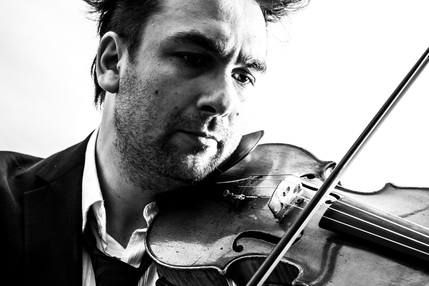
February
Bogdan Vacarescu (violin)
with Julian Jacobson (piano)
The Funtington Music Group’s concert on 10 February at the University of Chichester was entitled The Virtuoso Violin, an entirely appropriate name for Bogdan Vacarescu’s dazzling performance.
The concert began with George Enescu’s Sonata No 2. This Romanian composer, “the undiscovered Mozart of the 20th Century”, is not well known in the UK. Julian Jacobson on piano was as accomplished, as was the violinist, in interpreting Enescu’s particularly demanding music. “An unbelievably difficult piece” was how Bogdan Vacarescu described it to the audience as he talked about his musical education and narrative, which started from the age of four.
The Chopin Walzer Op 64 No 2 was played with a wide palette of varied tones and colours, along with the right rhythmic pulse and care of dynamics, and this led onto the Carmen Concert Fantasy by Sarasate, an appropriately placed, rather fun piece before the interval.
After the break, the programme moved to Beethoven’s Violin Sonata No 1 in D Major. Here Bogdan Vacarescu played with an effect which was profoundly expressive and resulted in an entirely convincing interpretation. Here it must be noted that the accompaniment of Julian Jacobson was outstandingly talented, played with great precision and sensitivity.
After fantastic applause both for a Brahms Hungarian Dance and an arrangement by Jasch Heifetz of Hora Staccato, Bogdan Vacarescu played with lyrical brilliance and in complete contrast, On Wings of Song Opus 34 No 2 by Mendelssohn. Here his innate sensitivity, purity of sound, and an uncompromisingly romantic interpretation resulted in an entirely convincing and appreciated performance.
The finale was Caprice No 24 by Paganini. Here Bogdan Vacarescu finally revealed, to those who still had any doubts, his phenomenal gift, his sheer musical technique, where he performed, with freshness and vitality, with an urgency and expressive spontaneity, one of the most challenging and dynamic string pieces of all time.
David Tinsley, Chairman of the Funtington Music Group, said, “What a wonderful evening of such fun and musical charisma. We have been privileged to hear two brilliant musicians. Such rapport between violinist and pianist is rare indeed. This was a really special concert for the Funtington Music Group”
Bogdan Vacarescu (violin)
with Julian Jacobson (piano)
The Funtington Music Group’s concert on 10 February at the University of Chichester was entitled The Virtuoso Violin, an entirely appropriate name for Bogdan Vacarescu’s dazzling performance.
The concert began with George Enescu’s Sonata No 2. This Romanian composer, “the undiscovered Mozart of the 20th Century”, is not well known in the UK. Julian Jacobson on piano was as accomplished, as was the violinist, in interpreting Enescu’s particularly demanding music. “An unbelievably difficult piece” was how Bogdan Vacarescu described it to the audience as he talked about his musical education and narrative, which started from the age of four.
The Chopin Walzer Op 64 No 2 was played with a wide palette of varied tones and colours, along with the right rhythmic pulse and care of dynamics, and this led onto the Carmen Concert Fantasy by Sarasate, an appropriately placed, rather fun piece before the interval.
After the break, the programme moved to Beethoven’s Violin Sonata No 1 in D Major. Here Bogdan Vacarescu played with an effect which was profoundly expressive and resulted in an entirely convincing interpretation. Here it must be noted that the accompaniment of Julian Jacobson was outstandingly talented, played with great precision and sensitivity.
After fantastic applause both for a Brahms Hungarian Dance and an arrangement by Jasch Heifetz of Hora Staccato, Bogdan Vacarescu played with lyrical brilliance and in complete contrast, On Wings of Song Opus 34 No 2 by Mendelssohn. Here his innate sensitivity, purity of sound, and an uncompromisingly romantic interpretation resulted in an entirely convincing and appreciated performance.
The finale was Caprice No 24 by Paganini. Here Bogdan Vacarescu finally revealed, to those who still had any doubts, his phenomenal gift, his sheer musical technique, where he performed, with freshness and vitality, with an urgency and expressive spontaneity, one of the most challenging and dynamic string pieces of all time.
David Tinsley, Chairman of the Funtington Music Group, said, “What a wonderful evening of such fun and musical charisma. We have been privileged to hear two brilliant musicians. Such rapport between violinist and pianist is rare indeed. This was a really special concert for the Funtington Music Group”
January
Welsh National Opera Touring Preview
with Sophie Rashbrook (dramaturg), Rhian Lois (soprano) & Jeffrey Howard (piano)
The Funtington Music Group was privileged on 13 January at the University of Chichester to listen to some Opera highlights featuring the Welsh National Opera. Introduced by Sophie Rashbrook, the Dramaturg at the WNO, the audience met Rhian Lois, soprano, and Jeff Howard, piano.
One of the fascinating surprises of the evening was the preview of some extracts from the new opera Figaro gets a Divorce. This opera will have its World Premiere in the spring, to be performed by the WNO.
Although in terms of the plot it is a sequel to The Marriage of Figaro, the music is certainly 21st Century, and Rhian Lois gave a sparkling and engaging interpretation. She showed in these pieces and in the others that she sang, that, as her voice matures and develops, she can move apparently effortlessly through the emotions, from, say, seductive passion, to a wide range of musical interpretations. She systematically demonstrated technical ability and showed that she can sing flawlessly, with beautiful clarity and masterly control.
Jeff Howard, currently repetiteur at the WNO. was the accompanist during the first half and the soloist after the interval. He systematically demonstrated technical ability and his pianistic skills were clearest in the least showy of his pieces as he accompanied Rhian Lois. But as a soloist, playing Rossini, as well as extracts from Carmen, Jeff Howard was at his sparkling and subtle best, ranging from ebullient gaiety to fragile delicacy and quiet lyricism.
“This was a most intriguing evening,” said David Tinsley, Chairman of The Funtington Music Group, “when our knowledge of the world of opera was widened by three very talented artists.”
Welsh National Opera Touring Preview
with Sophie Rashbrook (dramaturg), Rhian Lois (soprano) & Jeffrey Howard (piano)
The Funtington Music Group was privileged on 13 January at the University of Chichester to listen to some Opera highlights featuring the Welsh National Opera. Introduced by Sophie Rashbrook, the Dramaturg at the WNO, the audience met Rhian Lois, soprano, and Jeff Howard, piano.
One of the fascinating surprises of the evening was the preview of some extracts from the new opera Figaro gets a Divorce. This opera will have its World Premiere in the spring, to be performed by the WNO.
Although in terms of the plot it is a sequel to The Marriage of Figaro, the music is certainly 21st Century, and Rhian Lois gave a sparkling and engaging interpretation. She showed in these pieces and in the others that she sang, that, as her voice matures and develops, she can move apparently effortlessly through the emotions, from, say, seductive passion, to a wide range of musical interpretations. She systematically demonstrated technical ability and showed that she can sing flawlessly, with beautiful clarity and masterly control.
Jeff Howard, currently repetiteur at the WNO. was the accompanist during the first half and the soloist after the interval. He systematically demonstrated technical ability and his pianistic skills were clearest in the least showy of his pieces as he accompanied Rhian Lois. But as a soloist, playing Rossini, as well as extracts from Carmen, Jeff Howard was at his sparkling and subtle best, ranging from ebullient gaiety to fragile delicacy and quiet lyricism.
“This was a most intriguing evening,” said David Tinsley, Chairman of The Funtington Music Group, “when our knowledge of the world of opera was widened by three very talented artists.”

